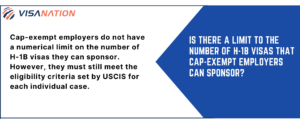The H-1B visa is intended for foreign professionals who are hired by U.S. employers for their skills and expertise in a specialized occupation. While most specialized workers pursue an H-1B visa through the annual H-1B cap lottery, H-1B cap-exempt employers do not have a set quota or annual limit. In this post, we’ll explore the H-1B exemption category as well as an H-1B cap-exempt employers list and other relevant details for qualifying.
Contact VisaNation attorneys for support with your H-1B Cap inquiry
What Is An H-1B Cap Exempt Employer?
USCIS conducts an H-1B lottery annually to randomly select 85,000 registrations across two rounds – the regular cap, in which all registrants can participate, and a second round exclusive to those with an advanced degree.
However, some organizations are exempt from the H-1B cap altogether, called cap-exempt employers. The advantage for H-1B cap-exempt employers is that they avoid numerical limitations or competition against larger companies for new H-1Bs.
Who Qualifies as an H-1B Cap-Exempt Employer?
- Higher education institution
- Non-profit organization associated with a higher education institution
- Non-profit research organizations
- Government research organization
VisaNation also advises that if you were previously on H-1B status and counted against the cap, a new employer can file a cap-exempt petition for you, even if you are outside the country. This petition allows you to reclaim the remainder of your 6-year maximum period of stay, regardless of how long you have been outside the U.S.

For example, Eric Chen was employed in the United States (on H-1B status) from February 15, 2013, to December 5, 2016. Would he be eligible to file for a new H-1B cap exemption? He would not be eligible to because he wasn’t in status in the past six years. This means he must file in the next lottery season.
Higher Education Institution
Requirements:
- Accredited university or college authorized by the state
- Admits students who are high school graduates
- Public or non-profit institution
- Licensed to administer higher-level education
- Award bachelor’s degree programs
The most common types of not-for-profit institutions include colleges and universities, as well as entities affiliated with medical labs, hospitals, and research units.
Based on VisaNation’s research of institutes that have filed LCAs for H-1B visas, top H-1B cap-exempt higher education institutes include the University of Michigan, Stanford University, Washington University, Princeton University, Columbia University, University of Pennsylvania, and Johns Hopkins University
If you are selected in the 2026-27 H-1B visa lottery, contact VisaNation attorneys for filing your H-1B petition.
Non-Profit Organizations Associated with Higher Education Institutions
Requirements:
- A non-profit entity. Non-profits that do not qualify: service, community, policy, and art organizations.
- Associated with the institution by shared ownership or board control
- Member, branch, or subsidiary of the institution
Secondary schools are not accepted for H-1B cap exemption. The only possible opportunity would be if the school has an affiliation agreement with a higher education institution.
Learn more about H-1B Cap-Exempt Jobs for non-profit organizations.
Non-profit Research Organizations or Government Research Organizations
Requirements:
- Non-profit research organization
- Conducts basic or applied research
———-OR———-
- Government research organization
- Maintains focus on conducting/promoting basic or applied research
Basic research is classified as achieving more knowledge or a comprehensive understanding of a specific area of interest. It also entails further development of existing scientific research, but not for the purpose of commercial objectives. Approved areas of interest include:
- science
- social science
- humanities
Applied research involves scientific investigations of discovering new knowledge for the purpose of achieving certain commercial objectives. Accepted research areas, as listed in basic research, are the sciences, social sciences, and humanities.
Examples of Non-profit Research Organizations
Examples of nonprofit research organizations include Mayo Clinic, Dana Farber Cancer Institute, Novartis Institutes for Biomedical Research INC
Examples of Government Research Organizations
Examples of government research organizations include the National Institutes of Health (NIH), NASA, Centers for Disease Control and Prevention, and the Department of Energy Laboratories
How to Find H-1B Cap-exempt Jobs
We advise those interested in seeking an H-1B cap-exempt job to narrow the scope of their cap-exempt job search to their specific area of specialty based on their work experience and degree. The H-1B requirements clearly outline that the H-1B job post must closely align with the beneficiary’s experience and degree type.
To find H-1B cap-exempt jobs, we recommend that you research specific organizations that align with your degree and have filed H-1B LCAs in the past. For example, a specialist in biomedical research should research organizations known to sponsor H-1Bs in the past, such as Novartis Institutes for Biomedical Research Inc., which filed 57 LCAs in FY 2025.
While researching databases and job sites, it’s important to verify that the organization is truly cap-exempt and they are currently sponsoring H-1B applications.
H-1B Job Search Checklist:
- My degree and experience match the job description’s specialty occupation requirements.
- The employer is a university, research institute, affiliated non‑profit, or government research organisation
- The employer’s field and their research fit my field.
- The job posting or employer history shows interest in hiring international professionals (optional).
H-1B Cap Exempt Employers and Jobs
When individuals typically think about H-1B cap-exempt employers and the positions available, they automatically assume that they have to be a teacher or in some collegiate role, when in fact there is a wide range of departments within universities and colleges.
For example, you might find an H-1B cap-exempt employer seeking help in the IT department or even the finance department. What’s more, in many institutions, there are medical centers that employ individuals in healthcare-related fields. To learn more about this option, consult one of VisaNation Law Group’s attorneys regarding H-1B cap-exempt employers.
USCIS Clarifications Regarding Cap Exemptions
In recent years, due to some confusion regarding the meaning of “cap-exempt” employers, the USCIS has issued some further clarification. They have made it clear that foreign workers who are not directly employed by a qualifying institution are still exempt from the H-1B cap, assuming that they can prove their employment supports or promotes the objectives of a cap-exempt qualifying institution. Showing this type of connection may be difficult for more complex cases.
Our Experience With a Client’s Case
We’ve had many successes helping clients obtain visas with cap-exempt employers. One such case was with a nonprofit organization that was looking to hire a beneficiary for a position in a community service area. Our client, who was the beneficiary, held foreign degrees in both law and economics as well as a master’s degree in economics.
While these are great accomplishments in themselves, they are not fitting for a community service organization by USCIS’s definition. We did a thorough review of our client’s qualifications, filed the petition, and waited for the USCIS’s response. The result was that USCIS issued an H-1B Request for Evidence (RFE). This might be bad news for some people, but our veteran attorneys have overcome countless RFEs to secure approvals for our clients.
USCIS questioned whether our client’s job was a specialty position. Our team broke down her day-to-day tasks, explaining why each one required the use of her education. In result, it was approved and our client was able to start the position in the U.S. for the nonprofit! See the complete success story here and more like it.
Contact VisaNation attorneys for support with your H-1B Cap inquiry
Finding the Right H-1B Cap Exempt Employers
Locating suitable H-1B cap-exempt employers based on your skill set doesn’t have to be challenging if you know where to search. There are a number of online databases dedicated exclusively to H-1B sponsored jobs and H-1B cap-exempt employer lists.
In the process of searching, however, be wary of organizations that are not specifically on the H-1B cap-exempt employers list or a related subgroup. For instance, an organization must be designated for the relevant tax provision in order for it to be considered a nonprofit organization. Merely claiming to be cap-exempt does not suffice to be considered cap-exempt.
Find out if getting a promotion while on H-1B status will affect your green card.
Benefits of Cap-Exempt Filing
There are several benefits to gain from a cap-exempt filing. If this is the first time you have gone through the H-1B application process, then working for a cap-exempt employer is a great option because you won’t be limited by the quota or any predetermined deadlines. Additionally, you maintain the option to transfer to a new cap-exempt employer thereafter.

If you are currently on H-1B status, then you will not be counted towards the cap. In other words, you can extend the time period you are in the country, alter the terms of your employment, file for a transfer, and more.
If you are an H-1B employee who wants to port from a cap-exempt employer to a cap-subject employer, you will need to wait until the next H-1B filing window to be entered into the cap. As the employee, you may not be eligible to start working with the new cap-subject employer until the pending H-1B petition is approved.
Transferring From Cap-Exempt to Cap-Subject
Some applicants may consider filing to enter the U.S. under a cap-exempt employer while maintaining the intention of transferring to a cap-subject employer later on. While this may seem like a convenient way to exploit this system, it may be more difficult than you initially think.
If you plan on moving from cap-exempt to cap-subject employment, you will need to have your new cap-subject employer file an I-129 petition on your behalf, which is subject to the lottery.
Therefore, there is no way to avoid the cap if you are planning to work for a cap-subject employer at any time during your stay in the U.S.
Recap of H-1B Cap Exempt Benefits
- No annual limits or quotas imposed
- No predetermined filing dates
- No predetermined employment start dates
In the past, our office has received a few inquiries as to the process or procedures when moving from a cap-exempt job to a non-cap-exempt employer. A few factors must be kept in mind if you find yourself in this position. The first is that you will be counted against the cap if you decide to make the switch. In other words, you’ll need to enter the H-1B visa lottery and hope your petition is submitted in either the regular category or the advanced degree category.
There is no guarantee when doing so, which means it is at your discretion and your own risk of not being selected. If you decide you want to make the move after the quota has already been exhausted, then you’ll need to wait until the next valid H-1B lottery season.
President Trump has signed a new proclamation introducing a $100,000 fee for new H-1B petitions. This change could impact employers and foreign workers planning to apply, but exclusions apply. Read our full article for more details
Does Premium Processing Make Me Cap-Exempt?
It does not. There is a common misconception held by some applicants and employers that paying the additional fee for the premium processing service will guarantee you a spot in the H-1B lottery or otherwise exempt you from the cap.
This is not true. Premium processing only expedites the I-129 petition’s processing time. It does not make you cap-exempt and it does not change your employment start date of October 1st. Make sure that you work with your immigration attorney before deciding to use premium processing to learn if it will be beneficial for your particular situation.
Frequently Asked Questions
Below are some of the most commonly asked questions and answers related to H1B cap-exempt employers and the process of obtaining your visa.
What is an H-1B visa cap-exempt employer?
An H-1B visa cap-exempt employer is an organization or institution that is exempt from the annual cap on the number of H-1B visas issued by USCIS.
Who qualifies as an H-1B visa cap-exempt employer?
H-1B visa cap-exempt employers include institutions of higher education (colleges, universities), nonprofit research organizations, and government research organizations.
How can I determine if an employer is cap-exempt?
You can determine if an employer is a cap-exempt by checking if they are classified as an institution of higher education, nonprofit research organization, or government research organization. Discuss this more with your immigration attorney to ensure your employer qualifies based on the USCIS cap-exempt employer guidelines.
Are all positions at cap-exempt employers eligible for H-1B visas?
Not all positions at cap-exempt employers are automatically eligible for H-1B visas. The position must be a specialty occupation that requires a minimum of a bachelor’s degree or equivalent.
Can cap-exempt employers sponsor H-1B visas for foreign workers indefinitely?
Cap-exempt employers have more flexibility in sponsoring H-1B visas, but there are still certain limitations. They can sponsor H-1B visas without being subject to the annual cap, but they must meet the criteria set by USCIS for each individual case.
What is the advantage of working for a cap-exempt employer?
Working for a cap-exempt employer provides the advantage of not being subject to the annual H-1B visa cap. This means that individuals can apply for an H-1B visa at any time of the year without having to wait for the H-1B visa lottery.
Can a cap-exempt employer convert to a cap-subject employer?
Yes, a cap-exempt employer can convert to a cap-subject employer if they no longer qualify as an institution of higher education, nonprofit research organization, or government research organization.
Can a cap-exempt employer sponsor an H-1B visa for a foreign student graduating from a U.S. university?
Yes, cap-exempt employers, such as universities and colleges, can sponsor H-1B visas for foreign students graduating from U.S. institutions, provided the position qualifies as a specialty occupation.
Are there any restrictions on changing employers when working for a cap-exempt employer on an H-1B visa?
Changing employers when working for a cap-exempt employer on an H-1B visa does not require going through the H-1B visa lottery again, as long as the new employer is also cap-exempt.
Can a cap-exempt employer hire H-1B visa holders who are already working for a cap-subject employer?
Yes, cap-exempt employers have the ability to hire H-1B visa holders who are already working for a cap-subject employer, as they are not subject to the H-1B visa cap.
Are there any fees associated with filing an H-1B visa petition with a cap-exempt employer?
Yes, there are still filing fees associated with the H-1B visa petition filed by a cap-exempt employer. These fees include the base filing fee, the ACWIA fee, and the Fraud Prevention and Detection fee.
Is there a limit to the number of H-1B visas that cap-exempt employers can sponsor?
Cap-exempt employers do not have a numerical limit on the number of H-1B visas they can sponsor. However, they must still meet the eligibility criteria set by USCIS for each individual case.
Can H-1B visa holders working for cap-exempt employers transfer to a cap-subject employer?
Yes, H-1B visa holders working for cap-exempt employers can transfer to a cap-subject employer. However, in such cases, they will be subject to the H-1B visa cap and will need to go through the H-1B visa lottery.
Can a cap-exempt employer sponsor an H-1B visa for a foreign worker located outside the United States?
Yes, cap-exempt employers can sponsor H-1B visas for foreign workers located outside the United States. The visa application process would still need to be followed, including the submission of required documentation and meeting all eligibility criteria.
Can a cap-exempt employer revoke an H-1B visa sponsorship?
Yes, a cap-exempt employer has the authority to revoke an H-1B visa sponsorship. However, the specific procedures and consequences of revocation may vary, so it is advisable to consult with an immigration attorney or legal expert in such cases.
Key Takeaways
We advise foreign professionals or U.S. employers to certify the employer’s qualifications under the H-1B cap exemption. The U.S. employer must qualify as one of the eligible categories. The H-1B cap exempt process is generally fast, especially when conducted for a higher education institution.
However, if the organization is not as well-known, such as for many non-profit organizations, the case will take more time to craft an in-depth analysis. Again, the cap-exempt category has no annual limits or quotas imposed, no predetermined filing dates, and no predetermined employment start dates.










